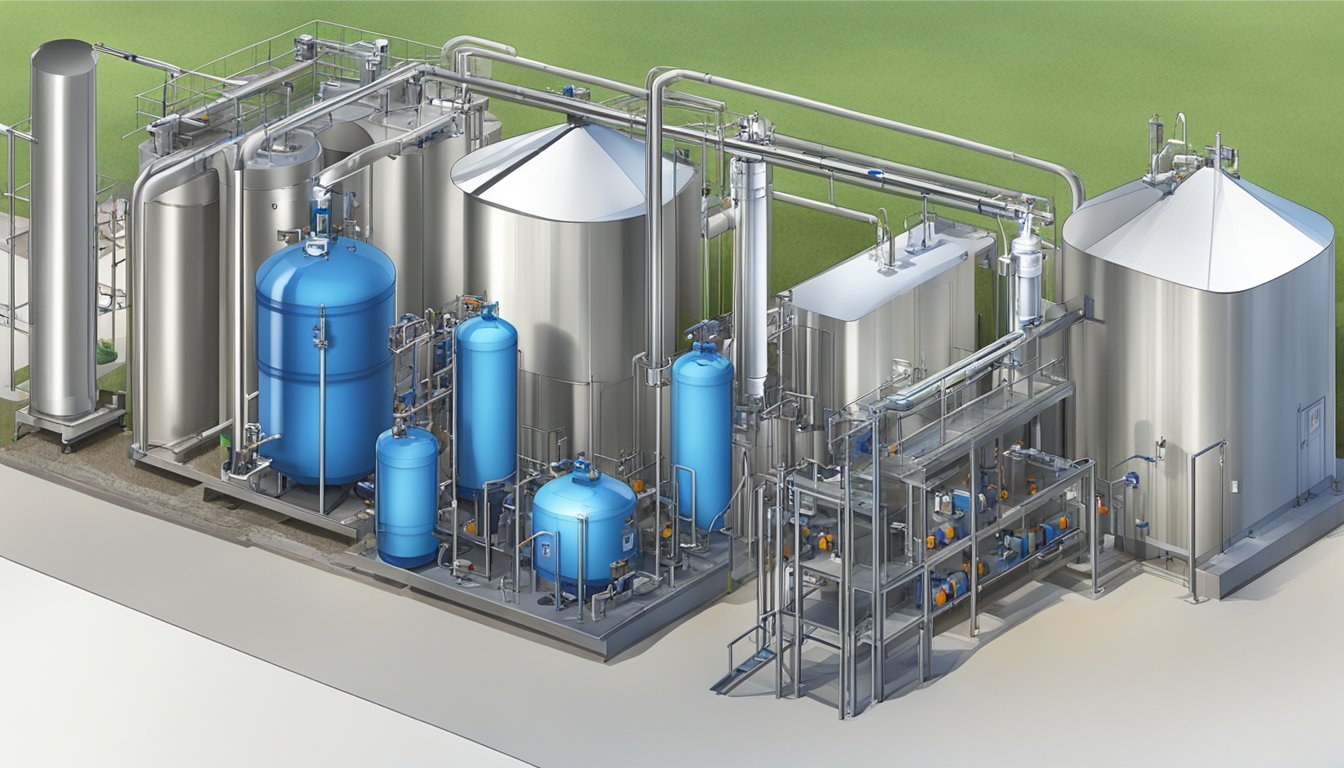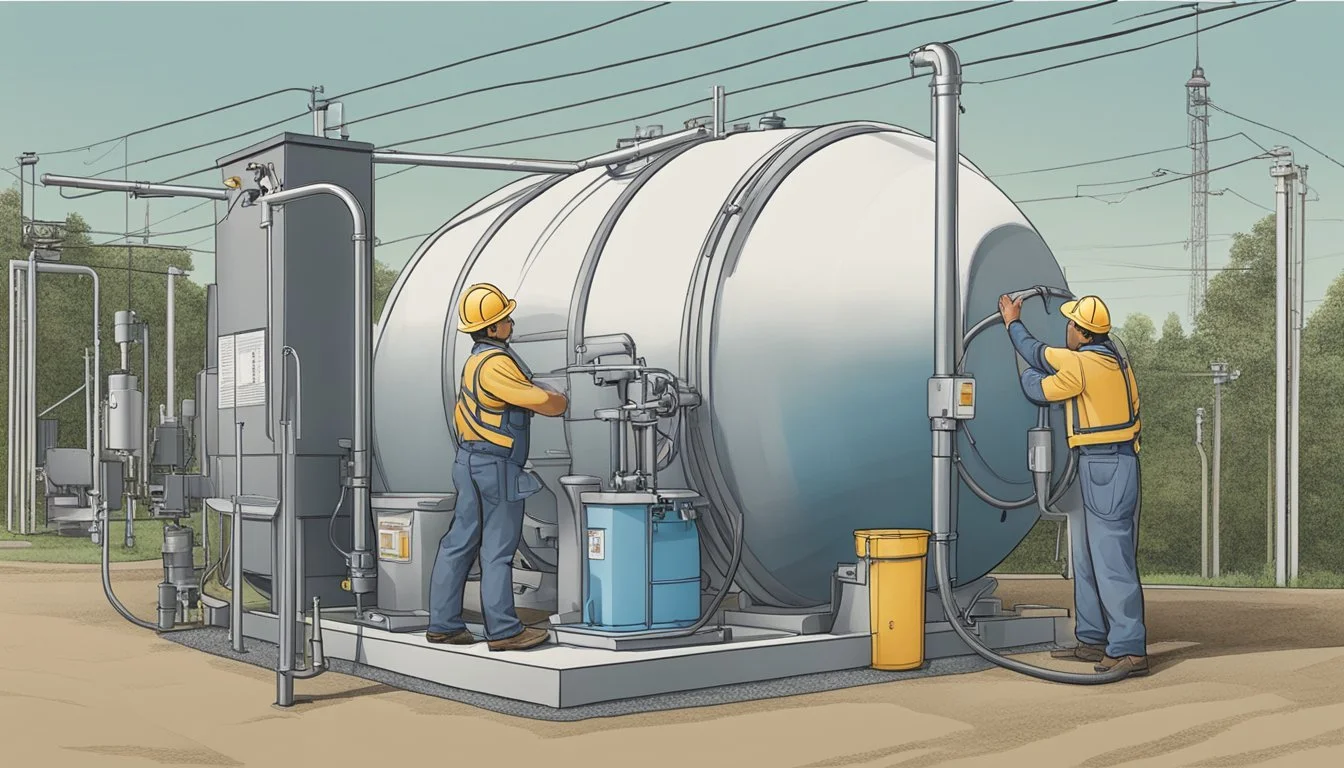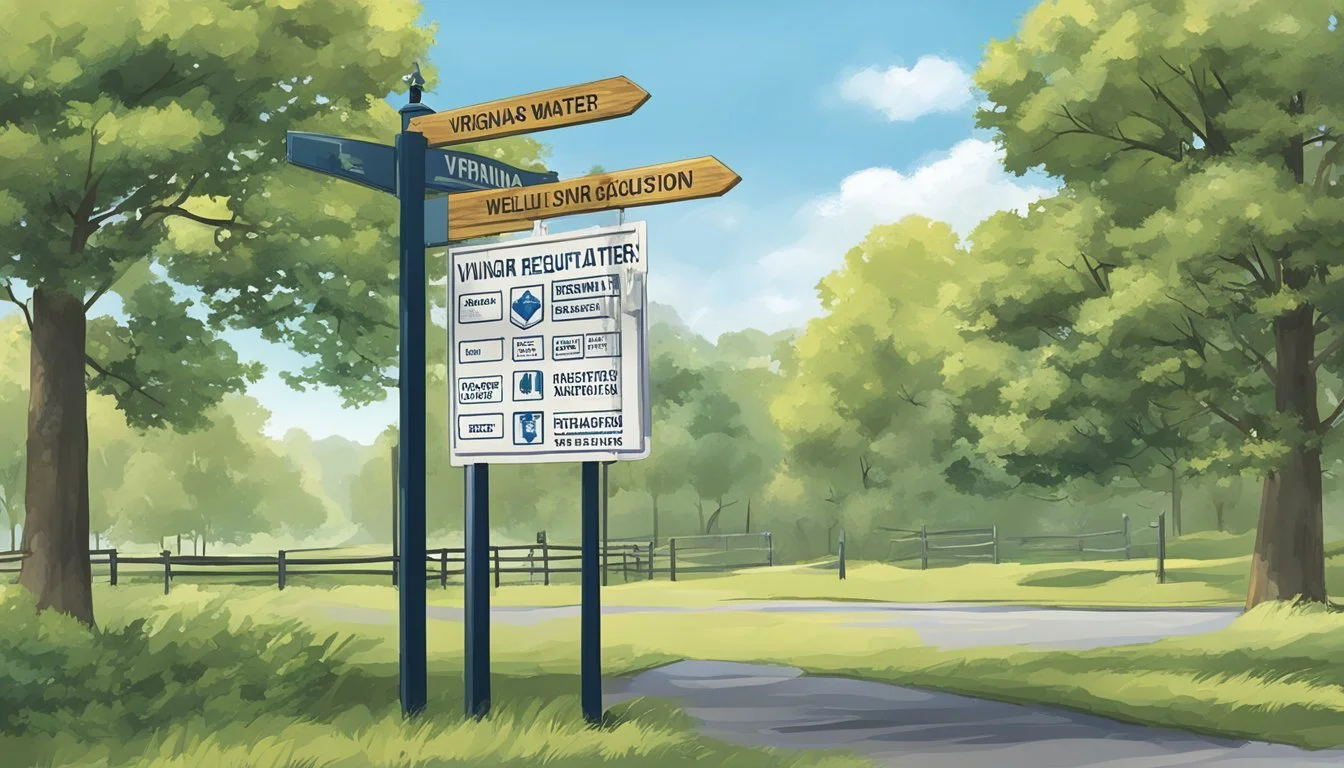Virginia Water Well Regulations
Understanding Compliance for Property Owners
In Virginia, the management and safety of private water wells are paramount to ensuring the health and well-being of its residents. Comprehensive regulations govern the construction, maintenance, and monitoring of these wells. These Private Well Regulations are specified under the Virginia Administrative Code, with detailed requirements that well owners and contractors must adhere to.
Understanding these regulations is critical, as they outline procedures that protect groundwater sources from potential contamination and assure that the water supplied to households meets acceptable standards. The Virginia Department of Health plays a key role in this effort, offering resources through their Private Well Program to educate citizens on proper well installation and the importance of regular water quality testing.
It is a responsibility for well owners in Virginia to stay informed about their water quality and the condition of their water wells. The state strongly advises regular testing and proper maintenance to ensure that water remains safe for consumption. Guidance and support from knowledgeable experts are readily accessible, as provided by Virginia's Environmental Health services, which offer Private Well Water Information to assist well owners on how to manage and protect their water systems effectively.
Virginia Water Well Basics
In the state of Virginia, regulations for private wells are established to ensure the safe extraction and use of groundwater. These guidelines are crucial for the health and well-being of residents relying on private well systems for their water needs.
Understanding Private Wells
Private wells in Virginia are defined as any artificial or artificially altered natural openings created to attain or allow the flow of groundwater. According to the Virginia Department of Health, private well owners have responsibilities concerning the construction, maintenance, and testing of their wells to ensure water safety.
Classifications of Wells
Virginia classifies private water wells mainly into two categories to standardize their design and usage:
Class III Wells: These are private wells constructed specifically for providing drinking water. In Virginia, this class is further subdivided, where a Class IIIA well, for example, is a drilled well with grouting around the casing to a minimum depth of 20 feet, ensuring a secure barrier against contaminants.
Class IV Wells: Although less common, a Class IV well typically includes wells not used for drinking water, such as those for monitoring, dewatering, or heating and cooling. These wells are constructed with different standards tailored to their specific non-potable functions.
Legal and Regulatory Framework
In Virginia, water well construction, maintenance, and abandonment are governed by a comprehensive legal and regulatory framework designed to safeguard the quality of the state's groundwater resources.
Virginia Administrative Code
The Virginia Administrative Code (VAC) includes specific provisions related to the construction and operation of private wells. Section 50 outlines the relationship to the State Water Control Board while Section 80 details the relationship to the Department of Professional and Occupational Regulation. These regulations are designed to ensure that private wells meet established safety and quality standards.
Code of Virginia and Statutory Authority
The Code of Virginia §62.1-258, under statutory authority, mandates that certified water well system providers must submit a water well completion report to the Department of Environmental Quality within 30 days of constructing any private well. Additionally, the General Assembly enacts statutes that provide the legal basis for the regulatory actions enforced by the Code of Virginia.
Department Roles and Responsibilities
Multiple departments have defined roles in regulating water wells within Virginia. The Local Health Department coordinates with the Department of Health, which, through §32.1-170 of the Code of Virginia, adopts administrative codes to ensure safe drinking water. The Department of Environmental Quality and the State Water Control Board are key entities in managing water resources, with responsibilities including the registration and oversight of water well construction to avoid any detrimental impact on the environment.
Water Well Construction and Location
In Virginia, the regulations governing the construction and location of water wells are established to protect water quality and ensure safe drinking water. They are specific about permit requirements, inspection protocols, and construction standards.
Permit and Construction Permit
Virginia requires a construction permit before any well drilling begins. The permit process ensures that well construction complies with state health and safety regulations. A detailed plat must accompany the permit application, outlining the proposed well site in relation to property boundaries and potential sources of contamination.
Inspection and Inspection Statement
After the well is constructed, it must be inspected by the district or local health department. A formal inspection statement is then issued, confirming that the well meets all health and safety regulations and is fit for intended use, protecting the water quality and health of the community.
Well Location Regulations
Well location is heavily regulated to prevent contamination of the water supply. Wells must be placed at a safe distance from any potential toxic substances, with a mandatory sanitary survey required for any obvious contamination sources within 200 feet as detailed in 12VAC5-630-380. Well location.
Casing and Collapsing Material Requirements
Proper casing is essential for preventing well collapse and maintaining water quality. In Virginia, Class IIIA wells, for instance, should have casing to a depth of at least 100 feet, and specific standards for collapsing material must be met, ensuring long-term stability and safety of the well structure as stipulated in 12VAC5-630-410. Construction; general.
Water Quality and Treatment
Ensuring water quality in Virginia wells involves a comprehensive program of testing and remediation to address contamination. The process is regulated by entities including the EPA and local health departments, focusing on maintaining standards and safety through effective treatment methods.
Water Quality Program
The Virginia Department of Environmental Quality administers a Water Quality Standards program aligned with the Clean Water Act requirements. This program establishes criteria to protect state waters, ensuring they are fit for public use and support aquatic life. The EPA provides oversight and sets guidelines such as the Primary Maximum Contaminant Levels (PMCL) that the state's program adheres to.
Testing and Reporting
Testing is a critical component of water quality management. It is recommended by the Virginia Department of Health that water from private wells is tested annually for coliform bacteria, nitrates, pH levels, and any other contaminants local to the area. Water quality reports must be submitted to the local health department, which documents the presence of any pollutants and informs necessary actions.
Contamination and Pollution
Contaminants such as pesticides, chloride, and various bacteria can pollute well water, posing health risks to consumers. Potential sources of contamination are diverse, ranging from agricultural runoff to improper disposal of waste. The state enforces regulations to mitigate these risks, often in cooperation with the EPA and other environmental agencies.
Treatment Systems and Disinfection
When water testing reveals contaminants that exceed safe levels, treatment systems are employed to restore water quality. Various water treatment solutions are available ranging from filtration systems to disinfection methods such as chlorination. The Virginia Department of Health's Private Well Program advises on the proper treatment and disinfection procedures, often involving the elimination of harmful coliform organisms and other bacteria through approved methods.
Well Maintenance and Abandonment
Proper upkeep and the correct abandonment of wells are essential for safeguarding groundwater in Virginia. Specific regulations are in place to ensure that these processes are carried out effectively and safely.
Routine Maintenance and Safety
Routine maintenance is crucial for the longevity and safety of water wells. Owners should:
Inspect the well's physical condition annually, including the well cap and casing.
Test water quality periodically for contaminants.
Address any contaminant presence or changes in water taste, odor, or appearance with prompt treatment.
It's essential that maintenance activities adhere to the Private Well Regulations to ensure safety and compliance with legal standards.
Well Abandonment Procedures
When a well is no longer needed, it must be abandoned following the Virginia well abandonment guidelines. The abandonment process includes:
Ensuring the well is free of obstructions.
Chlorination before sealing to eliminate residual contaminants.
Filling the well with an approved sealant material to prevent contamination of groundwater sources.
These steps help to prevent old wells from becoming pathways for pollutants to enter aquifers. Each step must be meticulously documented and reported in accordance with the Commonwealth's requirements.
Emergency Preparedness and Response
In Virginia, water well regulations mandate strict emergency preparedness protocols and effective responses to contamination events. These measures are essential for safeguarding public health and ensuring the continuous supply of clean drinking water, particularly during unexpected emergencies or pollution incidents.
Emergency Action Plans
Emergency Action Plans (EAPs) are critical components for water systems within Virginia. They outline systematic response procedures in cases of disruptions such as prolonged power outages, natural disasters like heavy rains, or other crises that could compromise water quality and supply. Each EAP should include:
Contact Information: A comprehensive list of emergency contacts and roles.
Response Strategies: Specific actions to restore the system and notify affected parties.
Maintenance Schedules: Regular inspections and upkeep to prevent system failures.
These plans ensure that personnel are prepared to act swiftly to maintain service and protect public health.
Dealing with Contamination and Pollution Events
When contamination occurs, immediate and effective action is required. Virginia's water well regulations necessitate:
Rapid Assessment: Swift analysis to identify the scope and source of contamination.
Public Notification: Timely alerts to consumers about potential health risks and steps to ensure water safety.
Remediation Measures: Procedures to mitigate contamination, such as boiling water advisories, temporary provision of bottled water, or system flushes.
Local ordinances may also complement state regulations, enhancing the comprehensive framework for dealing with water pollution events. These efforts collectively support the resilience of water systems against emergency scenarios and preserve the well-being of Virginia residents.
Regulatory Compliance and Documentation
In Virginia, it is essential for water well construction and maintenance to comply with specific regulatory documentation. This includes the submission of the Uniform Water Well Completion Report and adhering to the process of permit application and renewal.
Uniform Water Well Completion Report
The Uniform Water Well Completion Report is a critical document for the Virginia Department of Environmental Quality (DEQ). Certified water well system providers must create and submit this report within 30 days of constructing a private well within a Virginia Groundwater Management Area. The report is mandatory and helps maintain a record of water wells, ensuring the protection and management of the state's groundwater resources. Providers can submit the report electronically through the DEQ's portal or email the PDF version of the completed form.
Permit Application and Renewal
To construct or modify a water well in Virginia, one must obtain the necessary permits from the appropriate regulatory authority. The permit application process involves a comprehensive review to ensure that the proposed well complies with Virginia's water quality standards. Permit renewal is similarly vital for continuity in regulatory compliance; it typically necessitates an updated water well completion report or a sample tap test result to confirm that the water quality remains uncompromised. The details and status of a permit can often be reviewed and managed online, providing a streamlined process for both initial application and subsequent renewals.
Technical Specifications and Capacity
In Virginia, water well regulations mandate specific technical specifications and capacities designed to safeguard public health and ensure efficient water system management. These details address water system yields and capacities, alongside tailored requirements for residential and industrial applications.
Water System Yields and Capacity
Water System Yields:
Minimum yield requirements for a water system are pivotal; they ensure an adequate and continuous water supply.
Storage capacity is crucial in situations where yield is inconsistent, particularly during peak demand times.
Storage Considerations:
Storage facilities must be designed to maintain the necessary water quality requirements.
The size of the storage must correlate with the yield of the water system to provide a buffer during periods of high demand or maintenance.
Residential and Industrial Use Specifications
Residential Use Wells:
Capacity: Designed to meet household usage levels, factoring in daily consumption rates.
Connection: Residential wells must connect to in-home systems while preventing any potential contamination sources.
Industrial Use:
Larger capacity and reinforced structures for industrial use are focused on supporting higher demand and throughput.
Systems must ensure uninterrupted supply through both yield and storage capacity while meeting stringent industry-specific water quality requirements.
Please Note: The information provided must be verified with the current regulations via the Virginia Private Well Regulations to ensure compliance with the most recent standards and practices.
Frequently Asked Questions
Navigating water well regulations in Virginia is essential for homeowners and professionals involved in well construction and maintenance. These FAQs provide concise answers to some of the key regulatory standards and procedures.
What are the current private well construction standards in Virginia?
Private well construction in Virginia must adhere to standards set forth by the state to ensure the safety and reliability of drinking water. Certified water well system providers are required to submit a water well completion report to the Virginia DEQ within 30 days of constructing a private well in a Groundwater Management Area.
How can one obtain records of water wells in Virginia?
Individuals can obtain records of water wells by contacting their local Virginia Department of Health office. Records may include details such as construction, maintenance, and water quality. However, it is important to note that records prior to 1990 may not be available.
Are there specific guidelines for the distance between a well and a residential property in Virginia?
Virginia regulations stipulate clear guidelines regarding the distance of wells from potential sources of contamination. Specifically, wells must be located a minimum distance away from any source of toxic or dangerous substances, as detailed in 12VAC5-630-380.
What are the depth requirements for drilling a water well in Virginia?
While Virginia's private well regulations do not prescribe a specific depth universally, they do require that water wells be drilled to a depth that ensures safe drinking water. The depth must be sufficient to avoid contamination and reach a clean, potable water source.
What steps are necessary to ensure that well water is safe for consumption in Virginia?
Ensuring safe drinking water from wells in Virginia involves regular testing for contaminants, proper construction according to state regulations, and routine maintenance. Water quality assessments and employing certified well system providers are also pivotal steps in the process.
What are the recent changes to the water well regulations in Virginia?
To stay informed about recent changes, one should refer to the Virginia Law website for updates and amendments to private well regulations. Changes may involve adjustments to quality standards, reporting requirements, or construction guidelines, reflecting the ongoing commitment to water safety and public health.








